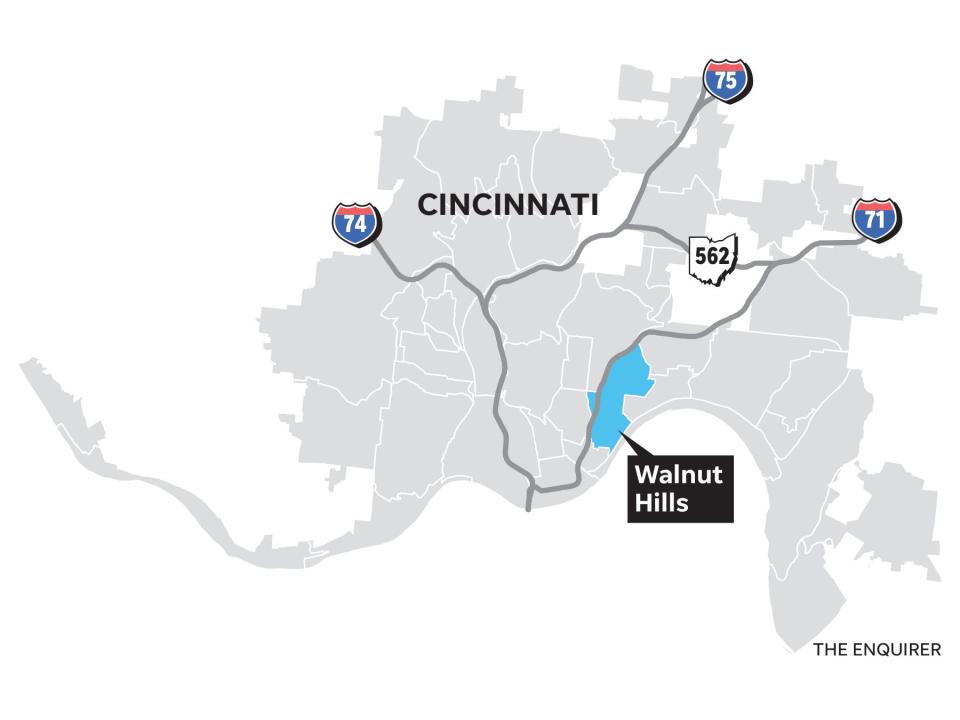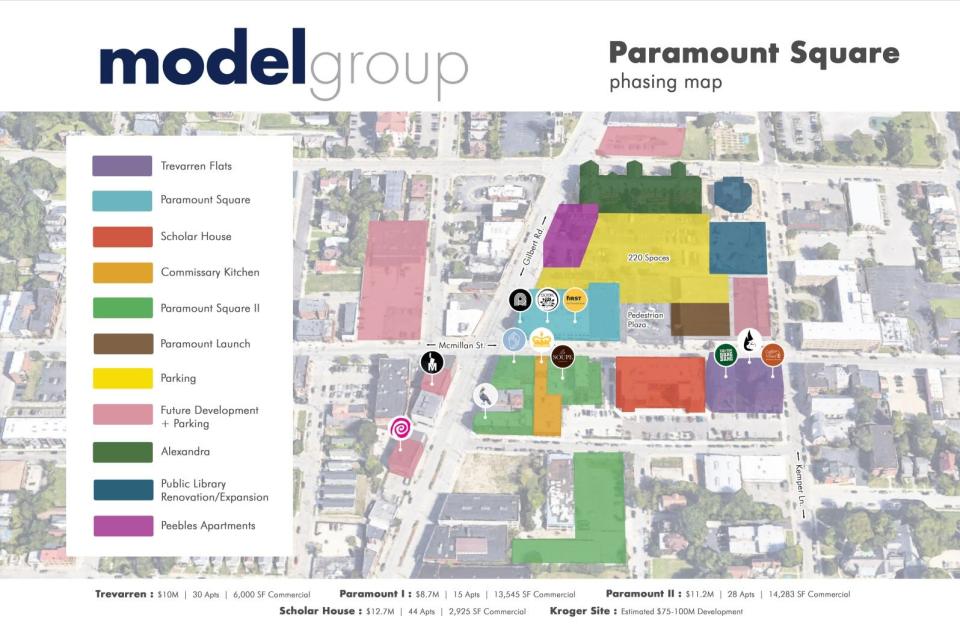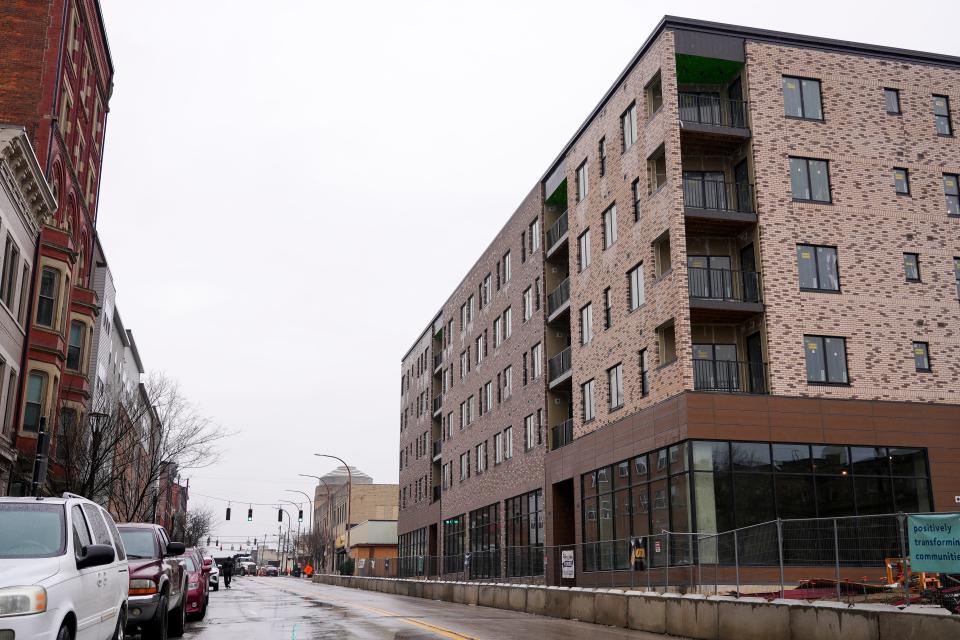This Cincinnati neighborhood has everything, except for what it needs

When residents of Cincinnati's Walnut Hills neighborhood learned they would lose their only supermarket in 2015, city and neighborhood leaders sprang into action.
Nearly a decade and $170 million later, the predominantly Black neighborhood has indeed been transformed into a destination for food and entertainment. Thanks to the vision of a developer, a neighborhood council and a community development corporation, the once-derelict business district around historic Peebles Corner is now a hot spot for award-winning restaurants, the city’s first minority-owned brewery and a handful of other small businesses such as a plant store, nail salons, an architecture firm and a vintage clothing store.
One thing it doesn't have? A grocery store.
And that exemplifies the transformation that has blessed ‒ and also bedeviled ‒ a number of Cincinnati neighborhoods. You can get a $17 cooked-to-perfection charred carrot. But good luck buying a bag of fresh carrots.

The city is happy to tout Walnut Hills as a success story. Mayor Aftab Pureval brought President Joe Biden to the neighborhood in 2023, declaring he "wanted to show the president that Cincinnati is the future ... Walnut Hills embodied that."
And yet people there are still missing the most basic of necessities: access to affordable food. One in 3 people struggle to find food in Cincinnati with many neighborhoods lacking nearby grocery stores.
“In building a community, I think it’s all about selecting important assets that people are going to use on a daily basis,” said Mona Jenkins, president of the Walnut Hills Area Council. “So if you’re bringing in a business that’s on the higher end, are we also bringing in something that caters towards folks at lower price points? How do we develop for everyone?”
Once a destination, always a destination

In the late 1800s, downtown Cincinnati grocer Joseph R. Peebles’ Sons Company expanded to the neighborhood, then on a streetcar line. People came to Walnut Hills to shop, attend shows at the Orpheum Theatre or get Graeter’s ice cream from the original family who churned it in a back room off East McMillan Street. By 1931, the cornerstone of the business district, Peebles Corner, was defined by the construction of the Art Deco-designed Paramount building.
By the mid-20th century, the neighborhood had started declining. From 1960 to 2010, Walnut Hills lost 14,000 people. Its historic buildings faded.
In the years ahead of Kroger’s 2017 exit, Over-the-Rhine-based developer Model Group partnered with the Walnut Hills Redevelopment Foundation to tackle two major rehabilitation projects totaling $30 million that kick-started everything:
Trevarren Flats merged three historic buildings into a 30-unit market rate complex with 8,000 square feet of ground floor commercial space that includes jazz bar and club Caffe Vivace, the offices of U.S. Rep. Greg Landsman and Team B Architecture & Design.
The Paramount building at 900 E. McMillan Street revived a former retail center and theater-turned-pharmacy into a mixed-use development with office space, housing Esoteric Brewing and one of the city’s hottest new Mediterranean eateries, The Aperture.

Five years later and the revived business district is now the perfect scene for a night out. East McMillan Street boasts well-known mainstays such as Fireside Pizza, Comfort Station, Just Q'in BBQ and Tiki Tiki Bang Bang and new Southern breakfast and lunch joint Rose Garden. Gomez Salsa, Esoteric and Decibel Korean Fried Chicken were recently joined by coffee and cocktail bar King Pigeon on Gilbert Avenue.
"Places like The Aperature and King Pigeon wouldn't have worked three or four years ago when we were in an earlier phase of redeveloping the area," said Model Group's Matt Reckman, principal and president of property management. Why? There are now more people living around the business district and it's a denser part of the neighborhood, which attracts the need for more diverse food options.
Jordan Anthony Brown, owner of The Aperature, told The Enquirer the menu will soon be updated with mezze-style portions for people who want to drop in for a quick bite. "Our goal is to ensure that this (restaurant) doesn't just have to be a destination," he said. "We want to make sure neighborhood locals don't have to make too much of a commitment to come in here."
Most of the budding businesses in Walnut Hills, like The Aperature, are owned by Black and female entrepreneurs with longtime links to the neighborhood. That's on purpose.
“We care about people being able to own businesses in their own backyard,” Reckman said.
Food insecurity is still at the heart of residents' struggles
Despite all the reinvestment in the local food culture, some residents say the destination restaurant options are beyond their financial reach. Walnut Hills is the 12th poorest neighborhood in Cincinnati with 40% of its 7,200 residents living in poverty, according to The Enquirer’s census-based Neighborhoods Report Card.
Kroger not only left a gaping hole in the middle of the neighborhood, but it turned Walnut Hills into a food desert, a community where residents – especially the elderly and low-income renters – don't have easy access to healthy, fresh or affordable food. Residents knew it was coming, so conversations about how to solve the issue began in the form of food town halls.
"We asked residents, 'How did you depend on Kroger being here? How is it going to change your life once the Kroger closes?,'" explained Gary Dangel, food access coordinator at the Walnut Hills Redevelopment Foundation.
Without access to personal transportation, some Walnut Hills residents have been forced to take the bus to Clifton, Norwood or Hyde Park. "This affects what people buy," he said. "If a single parent has to get on a bus and bring a kid or two to the grocery, they won't buy ice cream in the summer or a 10-pound bag of potatoes."
Places like The Pickled Pig, a restaurant and meat store, as well as La Soupe, a food rescue nonprofit, offer alternatives to a much-needed grocery store. Freestore Foodbank, Black Power Initiative, Church of the Advent's Open Food Door Pantry, and Queen Mother’s Market, a co-op which also sells and distributes groceries via parkside pop-ups, fill in some of the gap too.

But Walnut Hills’ new reputation as a place for sought-after food feels ironic when contrasted with residents’ ongoing food insecurity issues. Area Council president Jenkins, who is also co-founder of Queen Mother’s Market, thinks an affordable grocery store should have been the first amenity brought to the business district when the latest phase of redevelopment began. She wants to open Queen Mother's as a brick-and-mortar soon.
“The developmental policies that have been put in place are affecting the overall community wellness,” she said. “It’s not just about the absence of food.”
To balance the food offerings in Walnut Hills, Model Group is leasing new businesses. In September, ETC Produce & Provisions will open a 3,500-square-foot flagship store inside a new apartment complex on East McMillan Street. It's a dream location for owners Estevan and Toncia Chavez and a long time coming.
"We had our eye set on Walnut Hills when we first moved to Cincinnati in 2010," said Toncia. "Then we saw Kroger kind of turn their back on that whole neighborhood because they weren't making any money instead of making adjustments on their end."

This isn't the Chavezes' first foray into Walnut Hills. Estevan is a graduate of nearby Purcell Marian High School, and ETC has run a stand at the East Walnut Hills Farmers Market for years. They are serious about investing in Walnut Hills, so much so that they sold their farm of seven years.
Since 2019, the couple has operated ETC out of Findlay Market, but they've always known their next big step would be opening a grocery store in a "transitional neighborhood" like Over-the-Rhine, Toncia added.
"Walnut Hills already has great food and great community," Toncia said. "We're excited to be here to amplify that so not only the residents can hear it but the rest of the city can too."
ETC's new location will accept nutritional assistance vouchers for area residents in need.
The idea isn't to replace Kroger. That's impossible, the redevelopment foundation's Dangel added. "ETC fills a niche in the neighborhood and surrounding neighborhoods because they have a broad following throughout the city," he said. "And by having Queen Mother's Market come in, there will be affordability at all levels."
Locals have also been asking for a cheaper lunch spot, which Model and other building owners are also chasing. The Gilbert Avenue storefront that formerly housed Hoity Toity Donut (it closed in February after less than six months) will boast Bridges Napoli Cuisine come July.
Future business district changes to cater to daytime crowd
To Walnut Hills Redevelopment Foundation executive director Samantha Reeves, losing Kroger didn’t just deny easy access to food, it also meant losing the neighborhood’s “third place,” a community hub. She hopes that some of the office and housing projects currently under construction spark activity and bring back that lost foot traffic to the Gilbert Avenue Corridor.
“Walnut Hills is full of all these special, unique spaces from Five Points Alley to Green Man Park, so having a thriving business district here too is really important," Reeves said. "As we rebuild the density, we are trying to bring in amenities that cater to everyone, not just the people that will come visit."
This is vital to ensuring the success of the neighborhood’s new food and entertainment spots, added Samir Kulkarni, co-founder of The Palomar Cincinnati, a cathedral-turned-venue at 2622 Gilbert Ave.
As a longtime developer in Walnut Hills, he thinks the neighborhood needs more daytime workers or visitors. “We have all these things people can come and enjoy so we should try and bring more jobs here.”
This article originally appeared on Cincinnati Enquirer: Walnut Hills is booming, but a Kroger-sized hole remains

